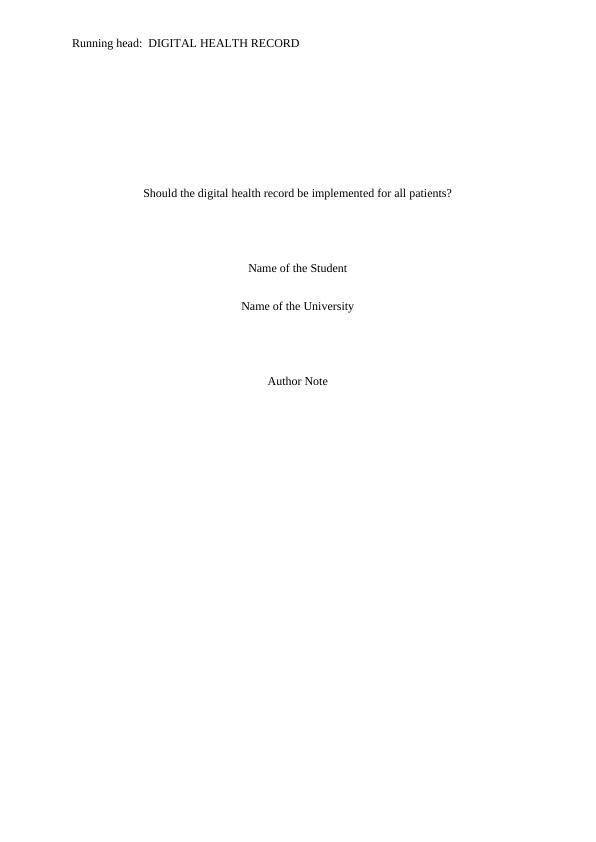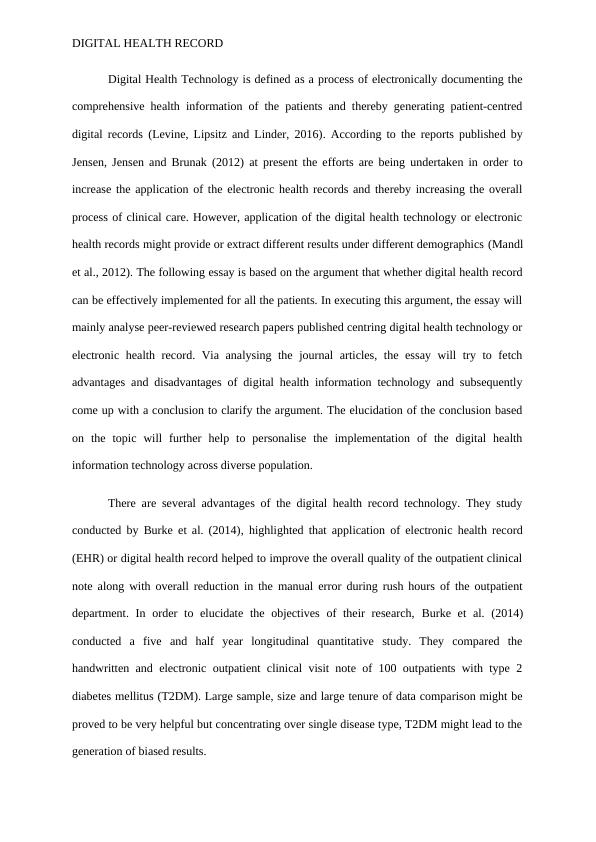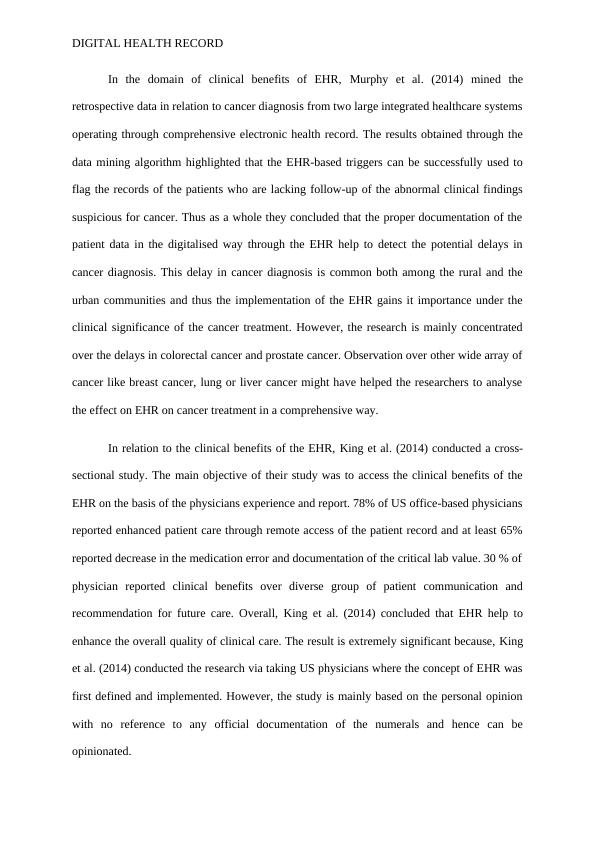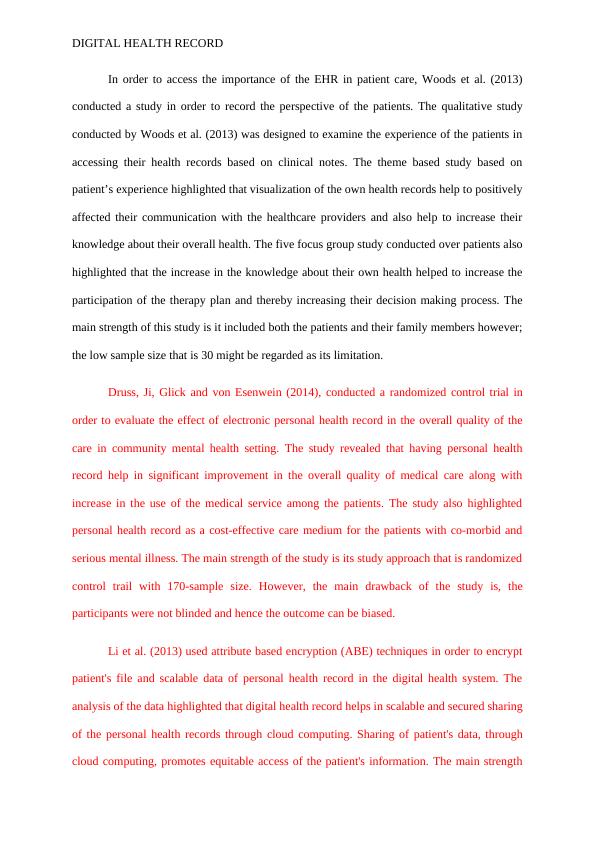Should the digital health record be implemented for all patients?
Added on 2023-06-09
12 Pages4002 Words270 Views
Running head: DIGITAL HEALTH RECORD
Should the digital health record be implemented for all patients?
Name of the Student
Name of the University
Author Note
Should the digital health record be implemented for all patients?
Name of the Student
Name of the University
Author Note

DIGITAL HEALTH RECORD
Digital Health Technology is defined as a process of electronically documenting the
comprehensive health information of the patients and thereby generating patient-centred
digital records (Levine, Lipsitz and Linder, 2016). According to the reports published by
Jensen, Jensen and Brunak (2012) at present the efforts are being undertaken in order to
increase the application of the electronic health records and thereby increasing the overall
process of clinical care. However, application of the digital health technology or electronic
health records might provide or extract different results under different demographics (Mandl
et al., 2012). The following essay is based on the argument that whether digital health record
can be effectively implemented for all the patients. In executing this argument, the essay will
mainly analyse peer-reviewed research papers published centring digital health technology or
electronic health record. Via analysing the journal articles, the essay will try to fetch
advantages and disadvantages of digital health information technology and subsequently
come up with a conclusion to clarify the argument. The elucidation of the conclusion based
on the topic will further help to personalise the implementation of the digital health
information technology across diverse population.
There are several advantages of the digital health record technology. They study
conducted by Burke et al. (2014), highlighted that application of electronic health record
(EHR) or digital health record helped to improve the overall quality of the outpatient clinical
note along with overall reduction in the manual error during rush hours of the outpatient
department. In order to elucidate the objectives of their research, Burke et al. (2014)
conducted a five and half year longitudinal quantitative study. They compared the
handwritten and electronic outpatient clinical visit note of 100 outpatients with type 2
diabetes mellitus (T2DM). Large sample, size and large tenure of data comparison might be
proved to be very helpful but concentrating over single disease type, T2DM might lead to the
generation of biased results.
Digital Health Technology is defined as a process of electronically documenting the
comprehensive health information of the patients and thereby generating patient-centred
digital records (Levine, Lipsitz and Linder, 2016). According to the reports published by
Jensen, Jensen and Brunak (2012) at present the efforts are being undertaken in order to
increase the application of the electronic health records and thereby increasing the overall
process of clinical care. However, application of the digital health technology or electronic
health records might provide or extract different results under different demographics (Mandl
et al., 2012). The following essay is based on the argument that whether digital health record
can be effectively implemented for all the patients. In executing this argument, the essay will
mainly analyse peer-reviewed research papers published centring digital health technology or
electronic health record. Via analysing the journal articles, the essay will try to fetch
advantages and disadvantages of digital health information technology and subsequently
come up with a conclusion to clarify the argument. The elucidation of the conclusion based
on the topic will further help to personalise the implementation of the digital health
information technology across diverse population.
There are several advantages of the digital health record technology. They study
conducted by Burke et al. (2014), highlighted that application of electronic health record
(EHR) or digital health record helped to improve the overall quality of the outpatient clinical
note along with overall reduction in the manual error during rush hours of the outpatient
department. In order to elucidate the objectives of their research, Burke et al. (2014)
conducted a five and half year longitudinal quantitative study. They compared the
handwritten and electronic outpatient clinical visit note of 100 outpatients with type 2
diabetes mellitus (T2DM). Large sample, size and large tenure of data comparison might be
proved to be very helpful but concentrating over single disease type, T2DM might lead to the
generation of biased results.

DIGITAL HEALTH RECORD
In the domain of clinical benefits of EHR, Murphy et al. (2014) mined the
retrospective data in relation to cancer diagnosis from two large integrated healthcare systems
operating through comprehensive electronic health record. The results obtained through the
data mining algorithm highlighted that the EHR-based triggers can be successfully used to
flag the records of the patients who are lacking follow-up of the abnormal clinical findings
suspicious for cancer. Thus as a whole they concluded that the proper documentation of the
patient data in the digitalised way through the EHR help to detect the potential delays in
cancer diagnosis. This delay in cancer diagnosis is common both among the rural and the
urban communities and thus the implementation of the EHR gains it importance under the
clinical significance of the cancer treatment. However, the research is mainly concentrated
over the delays in colorectal cancer and prostate cancer. Observation over other wide array of
cancer like breast cancer, lung or liver cancer might have helped the researchers to analyse
the effect on EHR on cancer treatment in a comprehensive way.
In relation to the clinical benefits of the EHR, King et al. (2014) conducted a cross-
sectional study. The main objective of their study was to access the clinical benefits of the
EHR on the basis of the physicians experience and report. 78% of US office-based physicians
reported enhanced patient care through remote access of the patient record and at least 65%
reported decrease in the medication error and documentation of the critical lab value. 30 % of
physician reported clinical benefits over diverse group of patient communication and
recommendation for future care. Overall, King et al. (2014) concluded that EHR help to
enhance the overall quality of clinical care. The result is extremely significant because, King
et al. (2014) conducted the research via taking US physicians where the concept of EHR was
first defined and implemented. However, the study is mainly based on the personal opinion
with no reference to any official documentation of the numerals and hence can be
opinionated.
In the domain of clinical benefits of EHR, Murphy et al. (2014) mined the
retrospective data in relation to cancer diagnosis from two large integrated healthcare systems
operating through comprehensive electronic health record. The results obtained through the
data mining algorithm highlighted that the EHR-based triggers can be successfully used to
flag the records of the patients who are lacking follow-up of the abnormal clinical findings
suspicious for cancer. Thus as a whole they concluded that the proper documentation of the
patient data in the digitalised way through the EHR help to detect the potential delays in
cancer diagnosis. This delay in cancer diagnosis is common both among the rural and the
urban communities and thus the implementation of the EHR gains it importance under the
clinical significance of the cancer treatment. However, the research is mainly concentrated
over the delays in colorectal cancer and prostate cancer. Observation over other wide array of
cancer like breast cancer, lung or liver cancer might have helped the researchers to analyse
the effect on EHR on cancer treatment in a comprehensive way.
In relation to the clinical benefits of the EHR, King et al. (2014) conducted a cross-
sectional study. The main objective of their study was to access the clinical benefits of the
EHR on the basis of the physicians experience and report. 78% of US office-based physicians
reported enhanced patient care through remote access of the patient record and at least 65%
reported decrease in the medication error and documentation of the critical lab value. 30 % of
physician reported clinical benefits over diverse group of patient communication and
recommendation for future care. Overall, King et al. (2014) concluded that EHR help to
enhance the overall quality of clinical care. The result is extremely significant because, King
et al. (2014) conducted the research via taking US physicians where the concept of EHR was
first defined and implemented. However, the study is mainly based on the personal opinion
with no reference to any official documentation of the numerals and hence can be
opinionated.

DIGITAL HEALTH RECORD
In order to access the importance of the EHR in patient care, Woods et al. (2013)
conducted a study in order to record the perspective of the patients. The qualitative study
conducted by Woods et al. (2013) was designed to examine the experience of the patients in
accessing their health records based on clinical notes. The theme based study based on
patient’s experience highlighted that visualization of the own health records help to positively
affected their communication with the healthcare providers and also help to increase their
knowledge about their overall health. The five focus group study conducted over patients also
highlighted that the increase in the knowledge about their own health helped to increase the
participation of the therapy plan and thereby increasing their decision making process. The
main strength of this study is it included both the patients and their family members however;
the low sample size that is 30 might be regarded as its limitation.
Druss, Ji, Glick and von Esenwein (2014), conducted a randomized control trial in
order to evaluate the effect of electronic personal health record in the overall quality of the
care in community mental health setting. The study revealed that having personal health
record help in significant improvement in the overall quality of medical care along with
increase in the use of the medical service among the patients. The study also highlighted
personal health record as a cost-effective care medium for the patients with co-morbid and
serious mental illness. The main strength of the study is its study approach that is randomized
control trail with 170-sample size. However, the main drawback of the study is, the
participants were not blinded and hence the outcome can be biased.
Li et al. (2013) used attribute based encryption (ABE) techniques in order to encrypt
patient's file and scalable data of personal health record in the digital health system. The
analysis of the data highlighted that digital health record helps in scalable and secured sharing
of the personal health records through cloud computing. Sharing of patient's data, through
cloud computing, promotes equitable access of the patient's information. The main strength
In order to access the importance of the EHR in patient care, Woods et al. (2013)
conducted a study in order to record the perspective of the patients. The qualitative study
conducted by Woods et al. (2013) was designed to examine the experience of the patients in
accessing their health records based on clinical notes. The theme based study based on
patient’s experience highlighted that visualization of the own health records help to positively
affected their communication with the healthcare providers and also help to increase their
knowledge about their overall health. The five focus group study conducted over patients also
highlighted that the increase in the knowledge about their own health helped to increase the
participation of the therapy plan and thereby increasing their decision making process. The
main strength of this study is it included both the patients and their family members however;
the low sample size that is 30 might be regarded as its limitation.
Druss, Ji, Glick and von Esenwein (2014), conducted a randomized control trial in
order to evaluate the effect of electronic personal health record in the overall quality of the
care in community mental health setting. The study revealed that having personal health
record help in significant improvement in the overall quality of medical care along with
increase in the use of the medical service among the patients. The study also highlighted
personal health record as a cost-effective care medium for the patients with co-morbid and
serious mental illness. The main strength of the study is its study approach that is randomized
control trail with 170-sample size. However, the main drawback of the study is, the
participants were not blinded and hence the outcome can be biased.
Li et al. (2013) used attribute based encryption (ABE) techniques in order to encrypt
patient's file and scalable data of personal health record in the digital health system. The
analysis of the data highlighted that digital health record helps in scalable and secured sharing
of the personal health records through cloud computing. Sharing of patient's data, through
cloud computing, promotes equitable access of the patient's information. The main strength

End of preview
Want to access all the pages? Upload your documents or become a member.
Related Documents
Records Of Patients Enabling Healthcare Professionalslg...
|1
|1089
|23
Apple Health Records: A Potential Tool for Electronic Health Record Platformlg...
|13
|3668
|213
Digital Record Systems in Hospitals and Learning E-Healthlg...
|11
|2598
|16
Improving Patient Care through Electronic Medical Record Systemlg...
|3
|514
|436
NIH information BTRIS Agrees that healthcare data security used to develop a clinical database designlg...
|6
|557
|490
Teaching Strategies in Nursing: A Case Study on the Use of Electronic Health Recordlg...
|4
|789
|383
